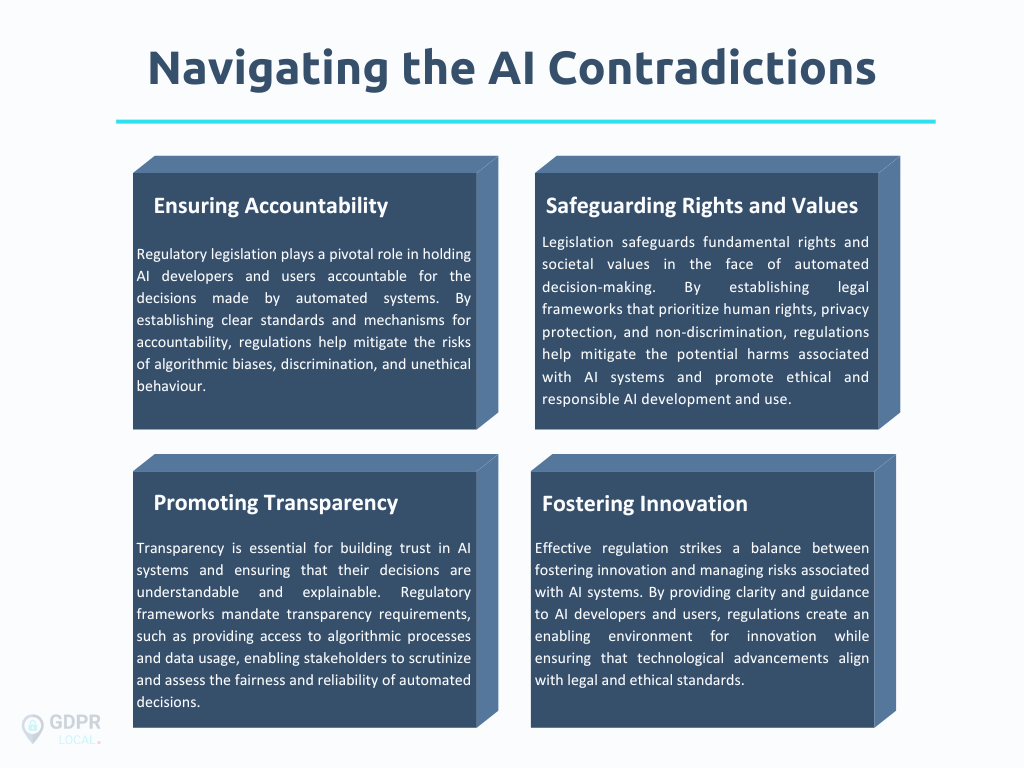Navigating the Contradictions: Automated Decision-Making and Regulatory Legislation in AI Systems
The Dilemma of Automated Decision-Making
At the heart of AI systems lies the promise of automated decision-making, driven by sophisticated algorithms capable of processing vast amounts of data and making predictions with unprecedented accuracy. From healthcare diagnostics to financial risk assessment, automated decision-making has the potential to revolutionize numerous domains, enhancing efficiency, and driving innovation.
However, the autonomy inherent in automated decision-making also raises critical concerns regarding accountability, transparency, and ethical implications. Without proper oversight, AI algorithms may perpetuate biases, discriminate against certain groups, or make decisions that contravene legal and ethical standards. This dilemma underscores the pressing need for regulatory frameworks to govern the development, deployment, and use of AI systems.
The Role of Legislation in Regulating AI Systems
Recognizing the potential risks and challenges posed by AI systems, governments and regulatory bodies around the world have sought to establish legislation to govern their use. These regulatory frameworks aim to ensure transparency, accountability, fairness, and human rights in the development and deployment of AI technologies.
Legislation such as the European Union’s AI Act, the General Data Protection Regulation (GDPR), and the United States’ Algorithmic Accountability Act, among others, set forth guidelines and requirements for AI developers and users. These regulations address various aspects of AI governance, including data privacy, algorithmic transparency, bias mitigation, and accountability for automated decisions.
Navigating the AI Contradictions
The contradictions between automated decision-making and regulatory legislation in AI systems pose significant challenges that require careful navigation. Here’s why effective regulation is crucial in addressing these contradictions.

In conclusion, the contradictory nature of automated decision-making and regulatory legislation in AI systems highlights the complex interplay between technological advancement and societal values. Effective regulation is essential in navigating these contradictions, promoting ethical and responsible AI development, and safeguarding the rights and interests of individuals and society as a whole. As we advance AI, we must balance innovation with regulation to ensure fairness, accountability, and transparency for the common good.
If you need any kind of assistance regarding the EU AI Act, feel free to reach out to us.
Póngase en contacto con nosotros
Esperamos que le resulte útil. Si necesita un representante de la UE, tiene alguna pregunta sobre el GDPR o ha recibido una solicitud de SAR o del regulador y necesita ayuda, póngase en contacto con nosotros en cualquier momento. Estaremos encantados de ayudarle...
Equipo local de GDPR.
Recent blogs
AI in Recruitment: Balancing Innovation with GDPR Compliance
AI in recruitment is transforming the HR landscape, offering unprecedented efficiencies and imp
The Future of Finance: Adapting to AI and Data Privacy Laws
The rapidly evolving landscape of financial technology is witnessing a significant transformation w
Navigating the Contradictions: Automated Decision-Making and Regulatory Legislation in AI Systems
The Dilemma of Automated Decision-Making At the heart of AI systems lies the promise of aut
